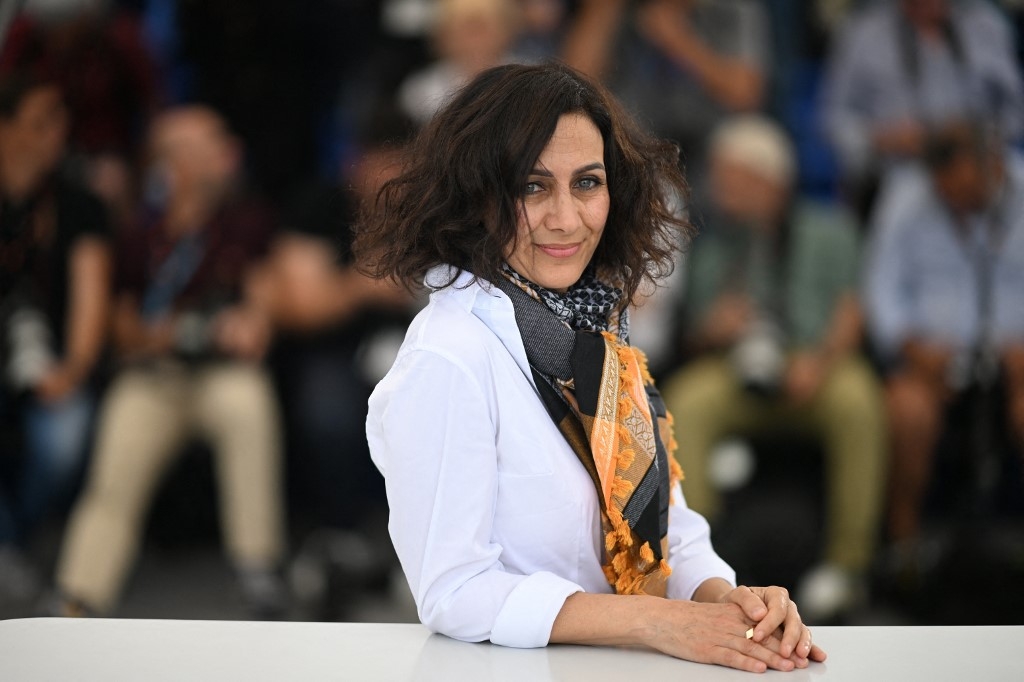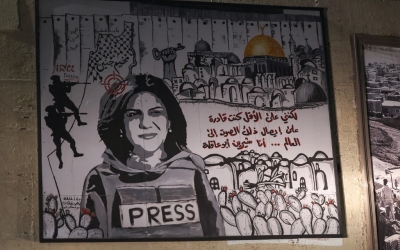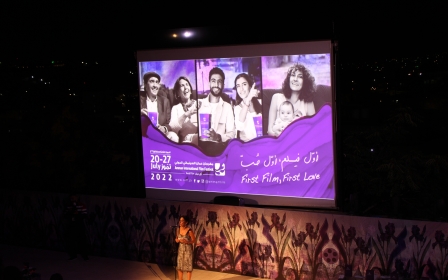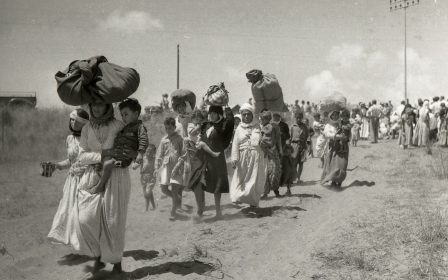Mediterranean Fever: How one Palestinian film resonated deeply with viewers

Around a thousand people attended the opening ceremony of the ninth Palestine Cinema Days film festival that took place in seven cities across Palestine this month, including Jerusalem, Ramallah, Bethlehem, Jenin, Haifa, and Gaza.
First launched in 2014, Palestine Cinema Days is the only Palestinian film festival that takes place in occupied Palestine. It was set up by Film Lab: Palestine, an organisation which promotes cinema culture and filmmakers in Palestine.
The festival kicked off with the screening of Maha Haj's acclaimed film Mediterranean Fever.
Starring Amer Hlehel, Ashraf Farah, and Shaden Kanboura, it won Best Screenplay for the “Un Certain Regard” category at the Cannes Film Festival in 2022, as well as the Firebird Award at the Hong Kong Film Festival. Next year, it will be Palestine's official Oscar entry.
With impressive cinematography and editing, which appear natural and seamless, the film is able to capture and clearly express the main characters' mental state and the difficulties they face.
New MEE newsletter: Jerusalem Dispatch
Sign up to get the latest insights and analysis on Israel-Palestine, alongside Turkey Unpacked and other MEE newsletters
The main character, Waleed, is 40 years old and lives in Haifa with his wife and children. He has a dream of having a writing career, but at the same time he is suffering from chronic depression.
Throughout the film, Waleed gets closer to his neighbour, who is a small-time crook with an ulterior plot in mind. The scheme brings the two men together in a way they didn't expect, and they end up becoming friends. However, it takes them on a journey full of dark encounters.
Award-winning film
For Haj, Waleed's poor mental health is representative of Palestinians at large, including those living in the occupied West Bank and the diaspora, as a result of being displaced from their homes in the Nakba of 1948.
“You might interpret Waleed’s depression as the depression of all Palestinians. It’s like a collective depression of the Palestinians,” the director told Middle East Eye.
“As a Palestinian, one of Waleed’s frustrations is Palestine being occupied, so he keeps watching the news about Gaza. Palestine is a part of him, and he feels like he’s on a mission to preserve it,” she added.
Although Haj doesn’t have a background in scriptwriting and never studied filmmaking, she says she has always had a passion for cinema and writing, and was thrilled to see the positive reactions to her film.
Previously she had worked as an art director and production designer, however the opportunity to write and direct was a new and exciting one for Haj.
'I never imagined that the day would come and I would be writing for a film'
- Maha Haj, film director
“I never imagined that the day would come and I would be writing for a film. I started to work as an art director on some films and I realised that I love this crazy thing called filmmaking,” she explained.
“I like being onset working with another 50 people…trying to work together, to fulfil the dreams and ideas of the directors,” she added.
Haj started to believe she had a talent for filmmaking after contributing to a number of films over the years, including The Time that Remains (2009), Personal Affairs (2016), and It Must be Heaven (2019).
“In 2009 I worked as art director with Elia Suleiman in The Time That Remains. Then I wrote a short film Oranges in 2009, and I directed it. It got some awards in some film festivals…which encouraged me to write even more.”
‘Outstanding work’
Directly after the screening of the film, the audience expressed their admiration for the film, with many praising the director for her outstanding work.
At the centre of the film is a brilliant performance from Amr Hlehel, aided by a script that enables viewers to contemplate deeply the issues raised in the film.
“I feel it represents us Palestinians, and even though it’s about depression, it wasn’t heavy for me to watch…but towards the end of the film, it felt a bit slow,” one young woman told Middle East Eye.
Another viewer Middle East Eye spoke to said that the depiction of mental health in the film was important, and showed how depression impacts people differently.
Impactful characters
When asked about her intentions and inspiration for Mediterranean Fever, Haj says that she was pulled towards certain characters and personality traits that she wanted to portray.
“I don’t remember a certain moment that brought me to write this script, I just knew I had to write about this character, Waleed, and as the script was developing, I introduced him to the other character, Jalal, and the story gradually unfolded,” she explained.
'I am a melancholic person with a somewhat sarcastic sense of humour, and throughout my life I have experienced depression, it’s not like I had to search on Google'
- Maha Haj, filmmaker
However, Haj’s awareness about depression, and some of her own personal experiences also played a part in the writing of the script and the film’s characters.
“I am a melancholic person with a somewhat sarcastic sense of humour, and throughout my life I have experienced depression, it’s not like I had to search on Google… on the
topic, I am very familiar with the symptoms of depression, yet with Waleed, I went to the extreme, it’s not what I had.”
Unlike many films about Palestine and mental health, Haj says that there was no particular message she wanted to convey, and instead, she wanted to leave it completely to the interpretation of the viewer.
“I don’t think that art should deliver a message. The idea that every work of art, including a film, play, or book, should include a message bothers me quite a bit. It’s not a didactic piece, it is just a story I wanted to tell, then it is entirely up to the viewer to form his own interpretation of the film when he leaves the theatre,” she says.
A touching tribute
Haj dedicated this film to the late journalist Shireen Abu Akleh, who was killed by Israeli forces while covering the army's raids on the Jenin camp earlier this year.
“When she was assassinated, it was two weeks before the screening in Cannes Film Festival 2022, so the wound was still very fresh in our hearts, I was enraged,” Haj said.
“I thought I should do something about it, I didn’t know what to do. But then I thought I’m at the 2022 Cannes Film Festival, almost a thousand people would be coming to watch my film, so I knew I should talk about Shireen."
For Haj, she said that dedicating the film as a tribute to Abu Akleh was the least she could do, and that it would also help bring awareness to what happened to her, as well as how the Israeli occupation impacts Palestinians.
The film has since been broadcast at a number of festivals around the world, including in countries such as Australia, the USA, Germany and Japan.
Middle East Eye delivers independent and unrivalled coverage and analysis of the Middle East, North Africa and beyond. To learn more about republishing this content and the associated fees, please fill out this form. More about MEE can be found here.





